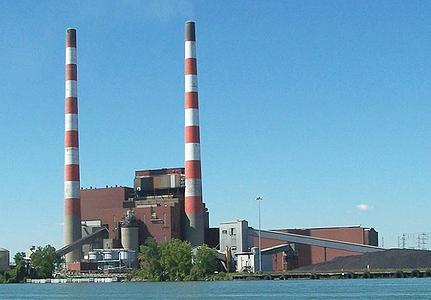
DETROIT, Michigan, May 27, 2020 (ENS) – DTE Energy has agreed to a date certain to close three polluting coal-fired power plans and the company will invest $7.5 million dollars to support environmental and sustainable improvements in Wayne County, Michigan. The investment is a key part of an agreement reached with the U.S. Environmental Protection Agency, EPA, and the Sierra Club that resolves an ongoing dispute over how the EPA’s new source review rules would apply to new emission control investments for coal plant operations.
DTE Energy, a Detroit-based diversified energy company, operates an electric company serving 2.2 million customers in southeast Michigan and a natural gas company serving 1.3 million customers across the state.

The agreement, known as a consent decree, enables DTE Electric to continue its promised progress toward net-zero carbon emissions by 2050.
“Our intent from the beginning of this process has been to reduce emissions, and this agreement allows us to involve the community to do even more,” said Skiles Boyd, vice president, Environment Management and Resources for DTE Energy. “We want to thank the EPA and the Sierra Club for working with us. This action by all parties will further improve the quality of life for residents of Wayne County.”
Under the proposed consent decree, DTE would be required to reduce emissions at each of its coal-fired electric units.
The decree also requires DTE to pay a civil penalty of $1.8 million and perform an environmental mitigation project that replaces municipal buses with lower emissions buses.
If approved by the court, the consent decree would settle a Clean Air Act enforcement action initially filed in 2010 that alleged violations at several DTE coal plants. Sierra Club, represented by the law firm Earthjustice, is a party to that enforcement action and a signatory to that consent decree.
The agreement with the EPA and the Sierra Club concludes the decade-old dispute over pre-project requirements for maintenance work at DTE coal plant operations.
Since DTE began new source review discussions with EPA and the Department of Justice, the company has invested more than $2 billion in emission control technology and another $2 billion in renewable energy while retiring more than 1100 MW of coal-fired generation.
In addition, DTE’s accelerated coal plant retirements for Trenton Channel, River Rouge, and St. Clair remain on track, the company said in a statement.
In a separate settlement agreement, the Sierra Club won enforceable retirement dates for these three DTE Energy coal-fired power plants in southeast Michigan. The River Rouge, St. Clair, and Trenton Channel coal-fired power plants will retire by December 31, 2022.
Combined, these three power plants annually emit more than seven million tons of the greenhouse gas carbon dioxide, 22,000 tons of polluting sulfur dioxide, and 8,000 tons of smog-causing nitrogen oxides.
Where two of the plants are scheduled to close, the settlement includes the company’s commitment to spend $7.5 million for environmental and sustainable activities in a defined area in Wayne County.
According to the agreement, the initial community improvement project will focus on transport electrification with a $5.5 million electric-powered bus program.
DTE will also assemble a Community Environmental Action Committee, made up of community and university representatives who will guide the deployment of funds for community-based environmental projects in River Rouge, Ecorse, and the 48217 zip code.
Projects determined by the committee may include:
* – An urban solar array
* – Urban foresting and farming
* – Energy reduction initiatives
* – Wildlife habitat restoration and education programs
With the settlement finding no new source review violations, DTE agreed to resolve the matter as “it is consistent with DTE Electric’s path to drastically reduce emissions by 80 percent and retire its coal operations by 2040. This is also consistent with its aspiration to achieve net-zero carbon emissions by 2050,” the company said.

Also included in the settlement, DTE will work with the Kemeny Recreation Center in Detroit to improve energy efficiency and reduce the overall energy costs of the facility.
“We are proud to announce this historic settlement agreement, delivering cleaner air to Michigan’s most disproportionately polluted communities,” said Rhonda Anderson, regional organizing manager and longtime environmental justice leader with the Sierra Club.
“Scientists recently confirmed that exposure to air pollution from coal plants decreases the chance of survival once contracting coronavirus, exacerbating the already dire threats facing communities in environmental injustice hotspots,” Anderson said. “Amidst the COVID-19 pandemic, this settlement agreement couldn’t have come at a more crucial time for Michigan communities.”
The retiring coal plants lack modern pollution controls and are located in areas of Michigan that the Environmental Protection Agency has designated as “failing to meet federal air quality standards” for sulfur dioxide. Several communities near these plants have a long history of enduring the impacts of heavy industrial pollution.
“These coal plants are expensive and polluting, and it is time to phase them out,” said Shannon Fisk, the Earthjustice managing attorney who litigated the matter on behalf of Sierra Club.
“DTE’s agreement to retire these plants and fund projects to benefit the frontline communities that have borne the brunt of the pollution from their operation is a step toward correcting decades of environmental injustices,” said Fisk. “It is critical that DTE also ramps up clean energy investments to replace these plants, and provide a just economic transition for the employees and communities that have relied on these plants for the past 40 years.”
Copyright Environment News Service (ENS) 2020. All rights reserved.
© 2020, Environment News Service. All rights reserved. Content may be quoted only with proper attribution and a direct link to the original article. Full reproduction is prohibited.



